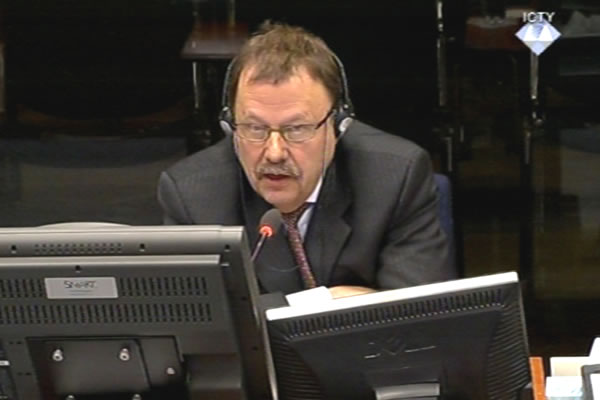Home
DEFENSE: UNPROFOR WAS A SIDE IN CONFLICT
In the cross-examination of the former UNPROFOR chief of staff Cornelis Nicolai, Ratko Mladic’s defense tried to prove that in the summer of 1995 UNPROFOR was not neutral. UNPROFOR ‘sided with’ the BH Army. Both UN and NATO thus became a ‘warring side’ in Bosnia and Herzegovina
 Cornelis Nicolai, witness at the Ratko Mladic trial
Cornelis Nicolai, witness at the Ratko Mladic trial In the cross-examination of Dutch general Cornelis Nicolai, Ratko Mladic’s defense tried to prove that in the summer of 1995, UNPROFOR was not neutral. UNPROFOR ‘sided with’ the BH Army and thus, both UN and NATO, became a ‘warring side’ in Bosnia and Herzegovina.
Mladic’s defense counsel Dragan Ivetic first showed an order issued to the Dutch Battalion in July 1995 instructing the Dutch soldiers to take up ‘blocking positions’ in the southern part of the Srebrenica enclave and to counter any attempts by the Serb forces to break through the line. According to the defense counsel, the conflict with the Serb troops was to provide a ‘pretext’ for UNPROFOR for calling in close air support from NATO.
Nicolai said it was a case of ‘drawing a line’ up to which the Serb forces could go. By deploying its troops in the south of the enclave UNPROFOR wanted to let the Serb forces know that if they crossed the line, there would be air strikes.
Ivetic suggested that UNPROFOR ‘sided with’ the BH Army when it allowed the BH Army to deploy its troops next to the Dutch Battalion positions so they could fight ‘shoulder to shoulder’ against the VRS. Nicolai denied the allegation but allowed that it could have led the Serb side to conclude that UNPROFOR had sided with the Serbs’ enemy.
According to Ivetic, the fact that in Srebrenica on 10 July 1995, the BH Army was allowed to use heavy weaponry from the collection points indicated that UNPROFOR was biased. The witness explained that in his view at that moment nothing could have been more reasonable: the VRS had been attacking the enclave for days, throwing everything it had at it, including heavy artillery.
Ivetic put it to the witness that the UNPROFOR command decided to call in the air strikes against Serbs in May 1995 although both sides had violated the UN Security Council’s resolutions. In that particular case, the VRS removed the heavy weaponry from weapons collection points, Nicolai retorted. The air strikes followed only when the Serb side refused to comply with the demands to return the seized artillery, Nicolai noted.
Ivetic also noted that General Rupert Smith thought the air strikes in May 1995 failed to achieve the goal, and that UNPROFOR ‘was very close’ to becoming an ally of the Bosnian government and ‘virtually ceased to be unbiased’. General Smith, the witness explained, warned that the use of force meant that a ‘border was crossed’ and that it could be interpreted as the UNPROFOR siding with the BH Government.
Finally, the defense played a video recording of Colonel Andrei Demurenko explaining why in his view the shell that caused the Markale massacre on 28 August 1995 had not been fired from the Serb positions. Nicolai didn’t want to comment on the technical details of Demurenko’s investigation, but he did note that The Russian colonel visited just a few of the locations long the shell’s trajectory. This automatically led Nicolai to doubt the results of Demurenko’s investigation.
Ratko Mladic’s trial continues on Tuesday, 7 May 2013.
Linked Reports
- Case : Mladic
- 2013-05-02 UNPROFOR’S MISJUDGMENT AND FEARS
- 2013-05-01 DID THE WITNESS SEE THE KILLING IN POTOCARI?
- 2013-04-26 ONLY EXECUTION VICTIMS WERE BURIED IN SREBRENICA GRAVES
- 2013-05-07 DID SREBRENICA POPULATION HAVE A CHOICE?
- 2013-05-08 MLADIC’S THREATS TO ‘BLUE HELMETS’
- 2013-05-09 SURVIVOR FROM RIVER JADAR BANK
